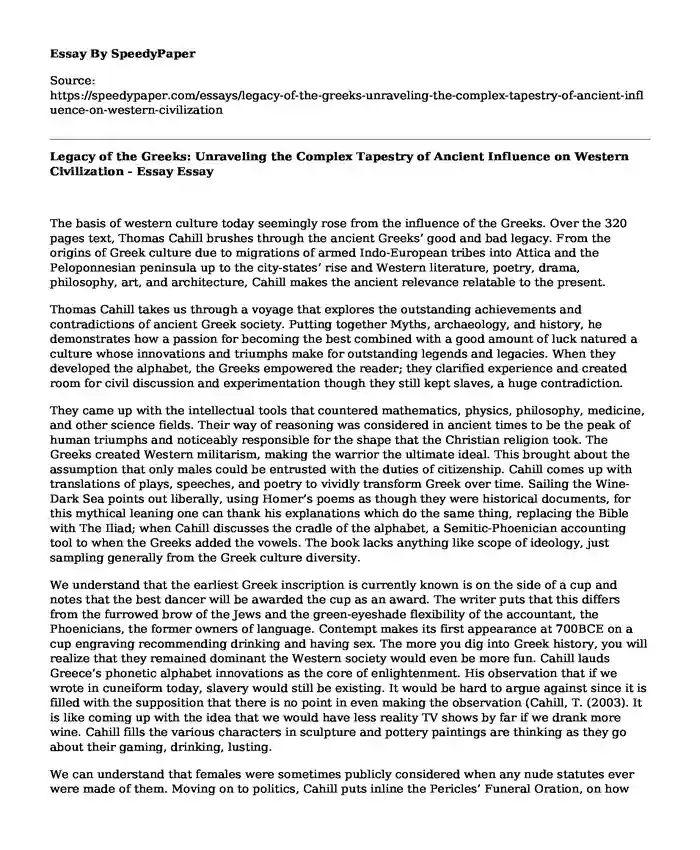
| Type of paper: | Essay |
| Categories: | Culture Ancient Greece |
| Pages: | 3 |
| Wordcount: | 649 words |
The basis of western culture today seemingly rose from the influence of the Greeks. Over the 320 pages text, Thomas Cahill brushes through the ancient Greeks’ good and bad legacy. From the origins of Greek culture due to migrations of armed Indo-European tribes into Attica and the Peloponnesian peninsula up to the city-states’ rise and Western literature, poetry, drama, philosophy, art, and architecture, Cahill makes the ancient relevance relatable to the present.
Thomas Cahill takes us through a voyage that explores the outstanding achievements and contradictions of ancient Greek society. Putting together Myths, archaeology, and history, he demonstrates how a passion for becoming the best combined with a good amount of luck natured a culture whose innovations and triumphs make for outstanding legends and legacies. When they developed the alphabet, the Greeks empowered the reader; they clarified experience and created room for civil discussion and experimentation though they still kept slaves, a huge contradiction.
They came up with the intellectual tools that countered mathematics, physics, philosophy, medicine, and other science fields. Their way of reasoning was considered in ancient times to be the peak of human triumphs and noticeably responsible for the shape that the Christian religion took. The Greeks created Western militarism, making the warrior the ultimate ideal. This brought about the assumption that only males could be entrusted with the duties of citizenship. Cahill comes up with translations of plays, speeches, and poetry to vividly transform Greek over time. Sailing the Wine-Dark Sea points out liberally, using Homer’s poems as though they were historical documents, for this mythical leaning one can thank his explanations which do the same thing, replacing the Bible with The Iliad; when Cahill discusses the cradle of the alphabet, a Semitic-Phoenician accounting tool to when the Greeks added the vowels. The book lacks anything like scope of ideology, just sampling generally from the Greek culture diversity.
We understand that the earliest Greek inscription is currently known is on the side of a cup and notes that the best dancer will be awarded the cup as an award. The writer puts that this differs from the furrowed brow of the Jews and the green-eyeshade flexibility of the accountant, the Phoenicians, the former owners of language. Contempt makes its first appearance at 700BCE on a cup engraving recommending drinking and having sex. The more you dig into Greek history, you will realize that they remained dominant the Western society would even be more fun. Cahill lauds Greece’s phonetic alphabet innovations as the core of enlightenment. His observation that if we wrote in cuneiform today, slavery would still be existing. It would be hard to argue against since it is filled with the supposition that there is no point in even making the observation (Cahill, T. (2003). It is like coming up with the idea that we would have less reality TV shows by far if we drank more wine. Cahill fills the various characters in sculpture and pottery paintings are thinking as they go about their gaming, drinking, lusting.
We can understand that females were sometimes publicly considered when any nude statutes ever were made of them. Moving on to politics, Cahill puts inline the Pericles’ Funeral Oration, on how great democracy is and how those who die supporting it are true heroes. Politics leads to the destruction of Greek culture; he criticizes various factions, more in Greece than the Epicureans, who he describes as gluttonous. Before introducing us to the plodding Romans, Cahill puts that it was only the interaction of Greek culture and Judeo-Christianity that was relevant to Western culture development. We cannot deny the Greek ideas’ influence on Christianity’s growth, but the Romans’ ragged conduct is unbecoming for a historian.
Reference
Cahill, T. (2003). The Greeks and us (Regarding” Sailing the Wine-Dark Sea”). NEW YORK TIMES BOOK REVIEW, 4-4.
Cite this page
Legacy of the Greeks: Unraveling the Complex Tapestry of Ancient Influence on Western Civilization - Essay. (2024, Jan 30). Retrieved from https://speedypaper.com/essays/legacy-of-the-greeks-unraveling-the-complex-tapestry-of-ancient-influence-on-western-civilization
Request Removal
If you are the original author of this essay and no longer wish to have it published on the SpeedyPaper website, please click below to request its removal:
- Genocide Essay Example
- Essay Example on Roosevelt's New Deal Programs
- The Perfect Christmas Gift, Essay Example
- Essay Example: Cross-Cultural Marriages
- Essay Example on Perceived Discrimination in Regards to Corporate Social Responsibility
- Paper Example. Race, Ethnicity, and Perception
- Memorable Job - Free Paper Example
Popular categories




